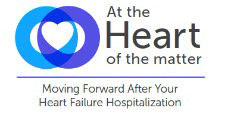
At the Heart of the Matter: moving forward after your heart failure hospitalization
A program sponsored by Merck in collaboration with The Mended Hearts, Inc. to help support people living with heart failure better understand their condition and take a more proactive role in their care.
Defining heart failure
Heart failure is a long-lasting-lasting condition in which the heart is unable to pump enough blood to meet the body’s needs for blood and oxygen. A collaborative approach to your care with your health care provider (HCP) can help manage your condition.
Americans will develop heart failure in their lifetime.
hospitalizations every year.
The risk of heart failure
People who currently have another heart condition or have had one in the past are more likely to develop heart failure. Some of the most common conditions that lead to heart failure are:
- Coronary artery disease, or the buildup of plaque in the arteries that supply oxygen-rich blood to your heart, which may cause a narrowing or blockage
- High blood pressure
- Type 2 diabetes

Understanding heart failure
It’s important to recognize some of the warning signs of heart failure and talk to your doctor if you’re concerned, including:
- Feeling short of breath, especially at rest
- Frequent coughing or wheezing
- Weight gain of more than 2-3 pounds in a day or more than 5 pounds in a week
- Loss of appetite and feeling sick to your stomach
- Swelling, especially in your legs, ankles and feet (called edema)
- Feeling tired all the time
- Feeling confused or experiencing impaired thinking
- Experiencing a faster heart rate
It’s important to monitor your heart failure
To diagnose heart failure, HCP's measure ejection faction, which is the amount of blood pumped with each heartbeat. Understanding your ejection fraction measurement can help your HCP recommend a management plan that is right for you.
There are ways to help manage your heart failure, including:

Taking your medicines as prescribed

Telling your HCP about any changes to your health

Making heart-healthy lifestyle changes as recommended by your HCP
Partnering with your HCP
Living with heart failure can be challenging, so in addition to having a better understanding of your heart failure to help manage your condition, it’s important to stay in close communication with your HCP and keep them informed of any changes in your symptoms.



US-VER-03190 10/23